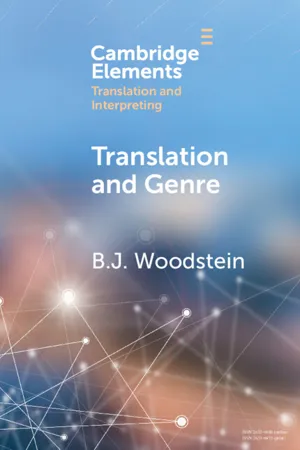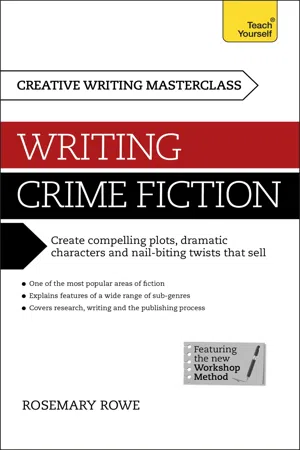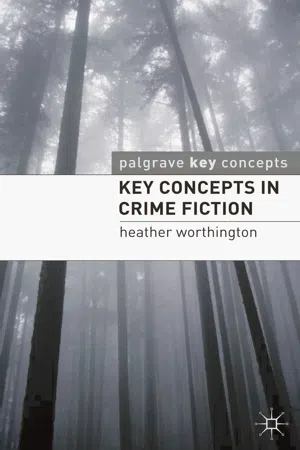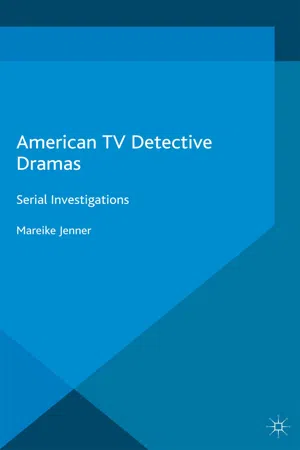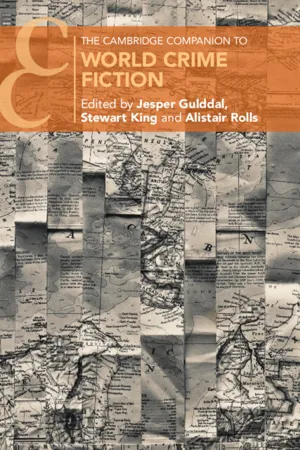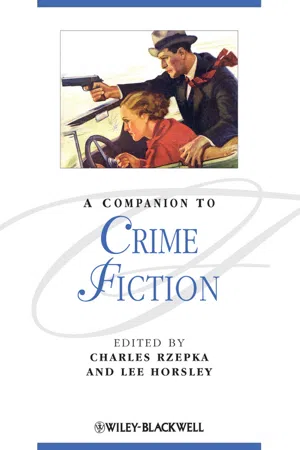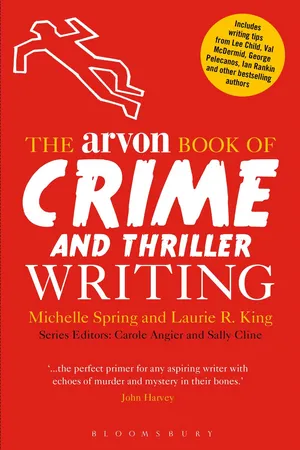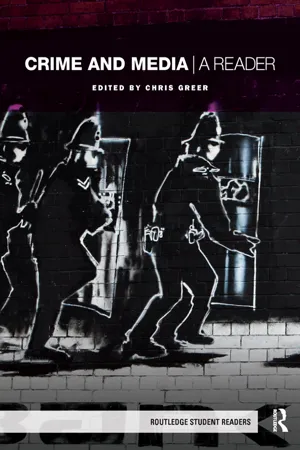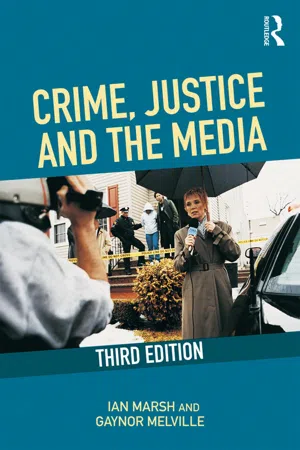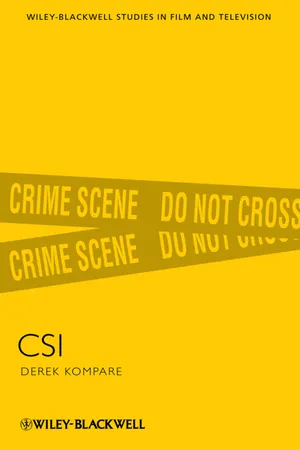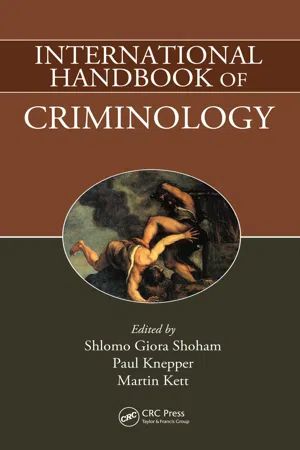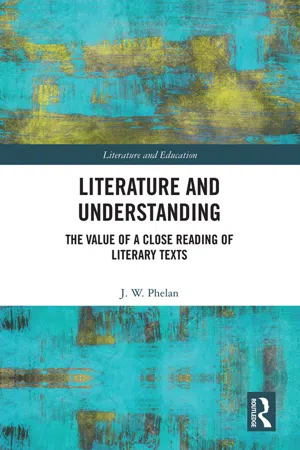Literature
Crime Fiction
Crime fiction is a genre of literature that revolves around the investigation and solving of crimes. It typically features a detective or investigator as the central character and often involves elements of mystery, suspense, and psychological tension. Crime fiction is known for its focus on the criminal act, the motives behind it, and the process of uncovering the truth.
Written by Perlego with AI-assistance
Related key terms
1 of 5
12 Key excerpts on "Crime Fiction"
- eBook - PDF
- B. J. Woodstein(Author)
- 2022(Publication Date)
- Cambridge University Press(Publisher)
They have certain expectations and have ideas about the function of the text, and when those expectations are met, potentially also in a way that is aesthetically pleasing, they enjoy the reading experience, while also not having those expectations met can potentially lead to 37 Translation and Genre a stimulating experience too. Worthington writes, ‘Crime Fiction is at once deeply conservative in its formulaic conventions and yet potentially radically in its diversity’ (2010, p. ix). Bradford sums up the genre by writing that no matter the subtype, Crime Fiction is about ‘constantly gathering evidence, attempting to make sense of patently unreal creations – by definition, puzzles – and close the gap between what we think we know and what the next page will tell us’ (2015, pp. 121–2). Given the many subtypes in this genre, it would be useful to think through what characteristics the texts in this field may contain. Palmer suggests that action is a key aspect and that the language usage emphasises the action. He writes that authors ‘dramatize a process’ so that ‘[a]ll actions, however mundane, become part of The Action, however insignificant’ (1979, p. 78). Palmer mentions other critics, who consider Crime Fiction ‘too corrupt and decadent’ (1979, p. 79), but he argues that a good thriller needs ‘a hero and a conspiracy’ and needs to ‘captur[e] the reader ’ s imagination’ (1979, p. 80). He adds that ‘what is specific to the thriller – what it is that attracts the thriller reader, whether critical or otherwise – is the view of the world that the thriller proposes’ (1979, p. 80). So generally, Crime Fiction contains action and a puzzle and tells readers something about their society, about ethics and what – or who – is considered ‘good’ versus ‘evil’. The resolution at the end of a crime work shows the values that a society holds dear. Porter writes that popular literature, such as Crime Fiction, serves as ‘a reflector and barometer of the society’ s ideological norms. - eBook - ePub
Masterclass: Writing Crime Fiction
How to create compelling plots, dramatic characters and nail biting twists in crime and detective fiction
- Rosemary Rowe(Author)
- 2014(Publication Date)
- Teach Yourself(Publisher)
1 Exploring the genreWhat is a Crime Fiction novel? This may seem self-evident but it is worth defining in our terms. A Crime Fiction novel is:What is Crime Fiction? As we shall discover in this chapter, there is a no single answer and even the classic types of this richly diverse genre – from whodunnit to howdunnit to whydunnit – can be broken down into subdivisions or their boundaries blurred. What matters, though, is that we should care about the characters involved and that there is real jeopardy – which means that there must be violence, usually murder, at the heart of the story.• a novel – which means a full-length book. You should aim at somewhere between 60,000 and 90,000 words. Any shorter and it becomes more of a novella or long short story, which are different markets. Any longer and it will be very difficult to sell. (However, even as I write, a crime story of over twice that length has just won the Booker Prize. In this game there are no absolutes.) But 60,000 or so words will give your book the greatest chance. When (and if) you find a publisher, your editor will guide you as to cuts – or even which parts of your story to expand.• fiction – which means you’re going to make it up. There is an entirely different market for non-fiction crime. Of course you may use real-life events, or even characters, as inspiration; everybody does. But as inspiration only. The final story comes out of your head – not out of research and newspapers. And since you have possibly never seen a corpse, much less a murder, you are simply going to have to imagine it.Key idea General advice to aspiring novelists is to ‘write about what you know’. Unless you are a murderer, police officer, advocate or judge, this won’t apply to the central incident in crime novels. This is the first of the ‘general rules’ that we are going to break.Even so, there are no absolutes. There is a sort of ‘half-fact’ variety, in which a purely fictional character re-examines a famous actual event – usually one that happened long ago. (There are also examples where this pretends to be the case but the supposed distant murder is imaginary too.) - eBook - ePub
- Heather Worthington(Author)
- 2011(Publication Date)
- Bloomsbury Academic(Publisher)
2 Texts: Themes, Issues, ConceptsIntroductionThe texts that comprise Crime Fiction are many and varied; the genre has its origins in factual narratives that were concerned with criminals and their crime and punishment, but from the latter part of the eighteenth and into the nineteenth century the factual accounts were gradually largely superseded by fictional forms. In parallel with this change of format came a textual change as the short narratives—criminal and execution broadsides, Ordinaries’ Accounts, entries in the Newgate Calendars, newspaper articles and short stories in the periodicals—were slowly joined and, in the twentieth century, overtaken by the novel. In many ways it can be argued that crime has always been implicated in the development of the novel, as seen in Defoe’s Moll Flanders (1722), where the protagonist passes much of her life and in a considerable part of the narrative as a criminal. In Factual Fictions: The Origins of the English Novel (1983), Lennard Davis argues that the novel is at heart a criminal form of literature, that ‘the form of the novel seems almost to demand a criminal content’ and that in representing imagined events and characters as real, ‘novelists become liars, perpetrators of the crime of fiction’. The criminal content of the novel is, over the nineteenth century, joined by other themes and issues and Crime Fiction becomes one genre among many, ameliorating the inescapable if unintended criminalisation of its writers.Equally, as the genre evolves, the focus moves from the criminal to the detective and later from the private investigator to the police detective, as Peter Messent has described in Criminal Proceedings - eBook - ePub
American TV Detective Dramas
Serial Investigations
- Mareike Jenner(Author)
- 2016(Publication Date)
- Palgrave Macmillan(Publisher)
As self-explanatory as the term ‘crime genre’ seems, there is some confusion over what actually constitutes it. Most approaches to the genre, whether in literature, film or television studies, work with very vague definitions. A common denominator is that a serious crime (or the appearance of one) lies at the centre of the narrative. This inclusive approach to genre has its advantages: it acknowledges the fluidity of any genre definition and can easily deal with generic hybrids like Analyze This (dir. Ramis 1999), which is a gangster film as well as a comedy. But the stories of crime can be told from various angles: The Godfather (dir. Coppola 1972) or L.A. Confidential (dir. Hanson 1997) are not films about ‘a crime’, but tell stories of criminal conspiracies, with the earlier film telling the story from the perspective of the criminal(s). A film like Philadelphia (dir. Demme 1993) deals with the issue of whether a crime has been committed, and parts of the film deal with the investigation of this crime. But the crime is wrongful termination – a serious crime, indeed, but rarely the stuff of crime stories – and the emphasis of the film is on melodrama. Films like Lethal Weapon (dir. Donner 1987) or Tango and Cash (dir. Konchalovskiy 1989) have the investigation of crimes at their centre, but narrative structures, point of view and the moments of ‘spectacle’ are different from those in the other texts. These examples are all from film, but the crime genre becomes even broader with the inclusion of novels ranging from Cop Hater (McBain 1956) to The Firm (Grisham 1991) or The Judge and His Hangman (Dürrenmatt 1951), or television dramas ranging from Murder, She Wrote to The Shield to more melodramatic series like Judging Amy (CBS, 1999–2005). The term ‘crime genre’ is also often used synonymously with its many sub-genres - Jesper Gulddal, Stewart King, Alistair Rolls(Authors)
- 2022(Publication Date)
- Cambridge University Press(Publisher)
chapter 1 What Is World Crime Fiction? Jesper Gulddal and Stewart King Contemporary Crime Fiction is, emphatically, a global phenomenon. Not only is it a genre with seeming worldwide popularity but it is also a genre whose present and past can only be understood as a result of exchanges across national and indeed continental borders. ‘World Crime Fiction’ is the name we propose here for Crime Fiction considered as a global literary field – a field shot through with inequities and spanning an almost endless diversity of themes and forms, yet nevertheless united by tropes and traits recognized across the world as defining Crime Fiction. The global reach of the crime genre is evident from the fact that Crime Fiction is written, published, sold and read on a significant scale on all continents and in virtually all countries with an established literary culture; it often ranks among the most popular forms of literature, and where it does not, this is in itself a gauge of the cultural and political conditions of the country in question. The production of world Crime Fiction is trans- national in the sense of involving a merger between internationally circu- lating tropes and local literary traditions, which leads to the creation of new formats. 1 Its reception is equally transnational: the genre travels across borders with great ease in the form of licensed editions and translations, and readerships across the world display little hesitation with reading foreign Crime Fiction; indeed, the combination of familiar forms and unfamiliar, ‘exotic’ content has become one of the major selling points of global crime writing. Finally, Crime Fiction itself appears eminently suited to give literary form to the interconnectedness of the local, the national and the global that characterizes today’s world; this is not surprising as crime, criminal investigation and the provision of justice are themselves prime examples of such transnational linkages.- eBook - PDF
- Charles J. Rzepka, Lee Horsley, Charles J. Rzepka, Lee Horsley(Authors)
- 2010(Publication Date)
- Wiley-Blackwell(Publisher)
The fact that these individuals have sought to keep their identities as literary authors and as writers of Crime Fiction separate suggests a certain chariness of their literary reputations, either on their part or their publishers’, and a wariness about their names being associated with a form that is today still considered artistically suspect in some quarters. For despite the canonization of crime literature – and, indeed, of popular literature in general – by the academic community over the past two or three decades (Priestman 1990; Ascari 2007), and despite the fact that many of the most revered masterpieces of world literature are centrally concerned with the subject of crime, practitioners and proponents of the genre continue to find themselves on the defensive regarding its artistic status. Even if studies like the present volume provide further confirmation of Crime Fiction’s canonization as literature, a vigorous critical debate may be expected to continue concerning Crime Fiction’s status as high literature or literary art – an honor customarily bestowed on books that appeal, at least in the short run, to a limited rather than to a mass readership. The issue is inevitably raised in the case of works of Crime Fiction written by authors with literary abilities or aspirations. Do such works reveal artistic qualities inherent in the genre, or are these works exceptions that belong to an elite (or effete) subgenre of their own? How do readers respond to such hybrid works that combine sensational effects appreciated by general audiences with a mix of subtleties and profundities appealing to more refined tastes? 1 Do Crime Fiction aficionados seeking what author and critic Clive James calls “the thriller thrill” have the patience to read stories dealing with crime but using a variety of literary techniques to explore a wide range of human - eBook - ePub
- Michelle Spring, Laurie R. King(Authors)
- 2012(Publication Date)
- Bloomsbury Academic(Publisher)
The whole genre question is further complicated by the undeniable fact that much Crime Fiction is indeed pap, pre-digested and undemanding, suitable for the reader who either lacks the inner fortitude necessary for tackling something with fibre (moral or otherwise) or simply doesn’t feel up to chewing his or her way through something substantial after a hard day’s work. Many writers, good writers who ought to know better, focus so tightly on the structure demanded by a crime story that they lose track of the fact that they are writing a novel. Accusations of both sensationalism and trivialisation are, alas, often justified.(Since we are concerned here with the mystery field, I shall politely refrain from pointing to the pap in mainstream fiction, those books where Nothing Happens apart from 300 pages of kvetching about a divorce. True, most mainstream pap gets thrown out before it sees print, whereas with a mystery, there’s always the hope that someone will fall for a gaudy cover. The point I’m making is not who has the worse record, but the difficulties in categorising a book.)A crime novel is about something; a mainstream story can be about anything. Knowing that a book is assigned to a genre makes the would-be reader feel snug or smug, depending on how that reader feels about the genre. To those who buy my books in order to curl up in the story, I can only say, thank you. To the smug deprecator of the mystery novel, I have to shake my head and say, You’re missing some fine writing .So why the mystery? Because it is a strong form that none the less allows me to do what I wish with it, possessing both rigid structure and immense freedom. On its bones I can hang a story about things that matter, about death and pain and the dark side of the human mind, about fear and triumph and joy and the price we pay for justice. A story about the full gamut of human response.The mystery novel, because the form is as big as I need it to be, and as intimate. The mystery, because it’s human.Why do I read Crime Fiction? It entertains me, yes, but it also teaches me about sides of life I will never see, and challenges me to think about my own actions.The crime story is, at base, a tale of quest. Medieval romances such as the saga of King Arthur saw knights questing, most famously, for the Holy Grail. The knight departs, to be caught up in a dark and perilous journey in which he becomes lost – or rather, during which the fact that he is lost slowly becomes clear to him. The mythologist Joseph Campbell describes the journey as the hero setting out from his comfortable, everyday world into a place of terrible forces and wonder, where he finally achieves victory and returns to his world, bringing some boon for his fellows. Many of Campbell’s elements are found in Crime Fiction: hesitation and an initial refusal of the call to adventure; some mentor who bestows a crucial gift; a dark road with trials, temptation and acceptance; and an often reluctant return, to the land he left, and where he finds himself irrevocably changed by his journey. - eBook - ePub
Crime and Media
A Reader
- Chris Greer(Author)
- 2019(Publication Date)
- Routledge(Publisher)
Here we reach a final question: what is to be done with the novels which do not fit our classification? It is no accident, it seems to me, that the reader habitually considers novels such as those I have just mentioned marginal to the genre, an intermediary form between detective fiction and the novel itself. Yet if this form (or some other) becomes the germ of a new genre of detective fiction, this will not in itself constitute an argument against the classification proposed; as I have already said, the new genre is not necessarily constituted by the negation of the main feature of the old, but from a different complex of properties, not by necessity logically harmonious with the first form.Critical connections
There is a wealth of literature on the enduring popularity of the detective novel, and the structure and appeal of Crime Fiction more generally (Knight 2004; Priestman, 2003; Clarke, 2001). Tzvetan Todorov’s ‘The Typology of Detective Fiction’ is included here because, like many of the readings in this collection, it is a defining example within its field. Crime Fiction, and perhaps especially the detective novel, remains one of the most popular forms of media entertainment available today. Mandel’s (1984) estimate two decades ago that more than 10,000 million copies of crime stories had been sold worldwide since 1945 can today be increased considerably. Agatha Christie novels alone have sold more than one billion copies, and up to one third of the fiction published in English belongs to the crime genre (Knight, 2004). Sutherland (2007), writing in The Times newspaper, noted the remarkable increase in the popularity of the detective novel in recent years, and in particular the new ‘multinationalism’ of crime writing which reflects the global breaking down of national boundaries (Dan Brown’s (2003) stellar-selling The Da Vinci Code is a case in point). Given its apparently growing popularity, its clear prevalence in libraries and bookshops, and the fact that many if not most of the crime films we watch today began life as crime novels, this literary form clearly merits the critical attention of media criminology.Considered alongside other readings in this collection, Todorov also illustrates the significance of genre across different media forms and formats. The excerpts by Steve Neale (Reading 11 ) and Barry Langford (Reading 26 ) make explicit use of genre analysis in their discussions of film studies research methodologies and critical readings of the gangster movie respectively. Both directly reference Todorov’s contribution to the field. Brian Jarvis’ Marxist and psychoanalytic treatment of the serial killer movie (Reading 27 - eBook - ePub
- Ian Marsh, Gaynor Melville(Authors)
- 2019(Publication Date)
- Routledge(Publisher)
CHAPTER 8 Crime, justice and the cinema▮ Popularity of films▮ What are crime films?▮ What is the appeal of crime films?▮ Film noir and crime films – detective and gangster films▮ Crime films and the criminological imagination.In looking at the way the media present and represent issues around crime and justice, the focus of critical discussion has tended to be on the press and print media or television as well as, more recently, the various forms of new social media. All of these areas are important, of course, and are discussed throughout texts such as this one. However, consideration of the ways in which crime and justice have been represented in the cinema and film is less usual. This is perhaps because although crimes, criminals and issues around justice feature in many if not most films, there is no recognized category that is titled ‘crime films’. So while a particular film may well include crime and criminals there is not a specific category or genre, as there is with a ‘horror film’, ‘rom-com’ or ‘western’, for example.Arguably this lack of a distinct category of ‘crime films’ is because such a high percentage of films will contain some kind of crime within them – and these crimes can be of widely differing types of course. We will come back to this discussion of categorizing crime films later but it is interesting to note that it is commonplace to assign genres to other areas of artistic or popular culture. In music, for instance, it is the norm to categorize different styles or genres, such as jazz, rock, pop, classical, and within those genres to have further and more detailed subgenres. Similarly, with literature we have categories such as romantic, tragedy or satire; and with art portrait, still life, realist, impressionist and so on. - eBook - ePub
- Derek Kompare(Author)
- 2011(Publication Date)
- Wiley-Blackwell(Publisher)
Accordingly, with such public and private consequences indicated by its very definition, crime has long fueled the interest of outside observers. While there are many historical and mythical antecedents, this interest becomes particularly active alongside modernity, beginning in the eighteenth century, when accounts of prison confessions, detailing crimes in graphic detail, were first published in books and periodicals. These precursors, to what we today refer to as “true crime” narratives, indicate a strong relationship between crime, spectacle (even in the written word alone), narrative, and official and popular consumption. In other words, crime began to function as both a category of State power and mass entertainment. By the mid nineteenth century, fictional crime stories clearly inspired by these accounts began to be published, detailing not only crimes but also their investigations by interested or official authorities. As John Scaggs describes in his history of Crime Fiction, the “rational detective,” first seen in the Dupin stories of Edgar Allan Poe in the 1840s, is a particularly modern character, schooled in the actions, objects and methods of post-Enlightenment civilization, and most often ensconced in its legal and moral codes, as well as its bureaucracy (2005: 33–49). Appearing in society virtually simultaneously with organized police departments, and replacing the clerical or royal decree of crime with intensive observation and logical deduction, detectives, even amateur or independent ones, were represented as agents of modernity in literature, solving crimes and reasserting the prevailing moral and social order, however contentious that may be.Moreover, they did so increasingly through the new theories and tools of forensic science, including photography, fingerprinting, and even lie detectors: all modern technologies and methods ostensibly designed to identify criminal individuals. As Ronald R. Thomas notes in his study of the concomitant rise of detective fiction and forensic criminology, the “detective narrative, in its deployment of these forensic technologies and in its resemblance to them, helped to make nineteenth-century persons legible for a modern technological culture” (1999: 17). This burgeoning “modern technological culture” of the late nineteenth and early twentieth centuries was defined by the new technologies and scientific methods of visibility. Technologies like photography, cinematography, and sound recording created new registers of spectacle, freezing in time and space moments – like Eadweard Muybridge’s famous 1878 photos of Leland Stanford’s galloping horse – that were once only fleeting, and disseminating mass-produced copies to far-flung viewers and listeners. Similarly, rapidly developing fields like biology, medicine, chemistry, and physics had begun to re-envision the world as a rational system of signs that could be made visible through increasingly precise scientific methods of experimentation and observation. By the beginning of the twentieth century, these practices, theories, and devices had redefined the world, down to the atom, as the realm of the visible. - eBook - PDF
- Shlomo Giora Shoham, Paul Knepper, Martin Kett(Authors)
- 2010(Publication Date)
- Routledge(Publisher)
Pedagogically, generations of criminologists learned this approach in theory and methodology courses. Of course, criminology also entailed an applied aspect [Chilton, 2001; Knepper, 2007]: knowing the truth about crime could and should affect crime policy, for example, through strategies that would make the criminal justice system more effective and just. As a form of cultural production, the crime genre dealt with these same themes. Generations of fictional police detectives, private detectives, citizen detectives, and lawyers tried to ferret out the solution to criminal mysteries in ways that would reveal the truth and produce a just resolution. Writers created these dramatic narratives and scholars analyzed them. Crime genre scholars worked within established canons of scholarship, usually in the tra-ditions of interpretative criticism. Most focused on a particular medium, for example, crime novels [Cawletti, 1976] or crime films [Krutnik, 1991]. Until about 20 years ago, most criminological media research focused on the inconsistency between media crime imagery and scientific crime data. Criminologists worried that because most people have little firsthand experience with crime or the criminal justice system, what they know about these matters comes mostly from television and other media [Savelsberg, 1994]. In the United Kingdom and United States, popular television crime dramas attract millions of viewers who watch representations about crime and justice, for example, what causes crime and what we should do about it. Increasingly, these representations, whether in news, drama, or reality programs, communicate images of crime that are inconsistent with accepted criminological evidence. Criminologists fear that these depictions cause public misinformation and an exaggerated and distorted sense of the crime problem. - eBook - ePub
Literature and Understanding
The Value of a Close Reading of Literary Texts
- Jon Phelan(Author)
- 2020(Publication Date)
- Routledge(Publisher)
Fiction is a species of language use (applied to names, sentences and discourses) and is neutral as to value. Literature, even in the narrowest sense applied to imaginative and creative writing, is a kind of discourse, essentially valued, which affords and invites a distinctive kind of appreciation.(Lamarque 2014: 69)Actually, ‘fiction’ is subject to evaluation on some occasions. Karl May was condemned when his novels set in the Wild West, and reputedly based on fact, were revealed as fiction. In this instance, the disappointment of many readers extended beyond disappointment at being hoodwinked to dissatisfaction at being left with ‘mere fiction’. In another type of case, fiction may be criticised for containing factual inaccuracy. A novel set in Cambridge which contains the line ‘I left Magdalene College and walked across the road to the Fitzwilliam Museum’ contains a factual accuracy and one that would disturb a reader familiar with the city. Let us also imagine that this detail served no purpose in the novel so could not be excused as ‘poetic license’. This type of case results in a kind of imaginative resistance, of a non-moral kind, which leads to a negative evaluation of the work. Here genre convention plays a role in evaluation. If the novel is realist fiction and if a particular detail is wrong about the subject depicted, then the novel may be criticised for containing an error. In this second example, the work is criticised for being ‘too fictional’ given the genre conventions of realist fiction.Nevertheless, it is true that describing a work as a work of ‘fiction’ is not usually evaluative but the kind of categorisation publishers use to help readers distinguish what is invented from what is fact; for instance, to differentiate ‘true crime’ from ‘detective fiction’. In contrast, calling a work ‘literature’ is predominantly evaluative and involves some form of aesthetic appreciation. This kind of literary appreciation seems separate from personal preference; I may recognise a late Henry James novel as literature without the work being to my taste. The upshot of this brief discussion is that I am loath to dismiss the evaluative aspect of literature as it corresponds with our ordinary usage of the term and captures something of the Gestalt of reading a text as a work of literature.
Index pages curate the most relevant extracts from our library of academic textbooks. They’ve been created using an in-house natural language model (NLM), each adding context and meaning to key research topics.
